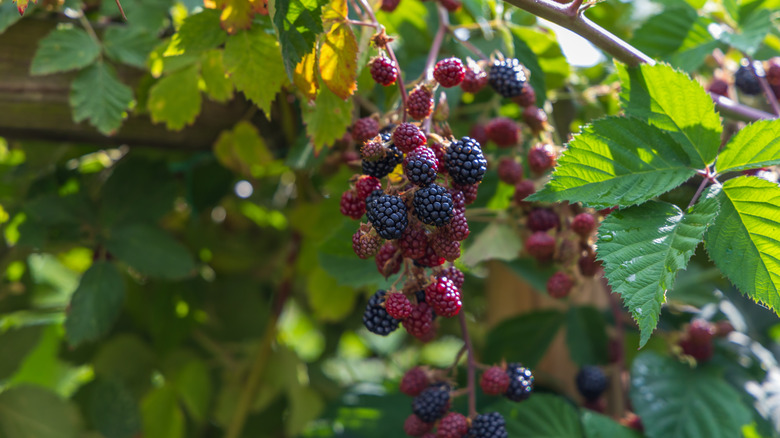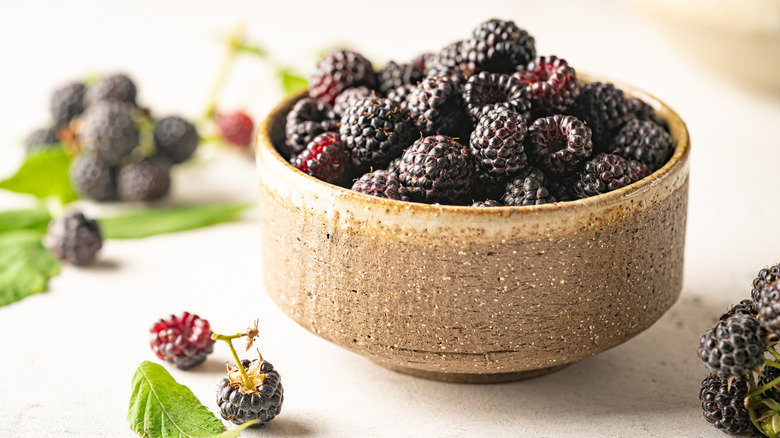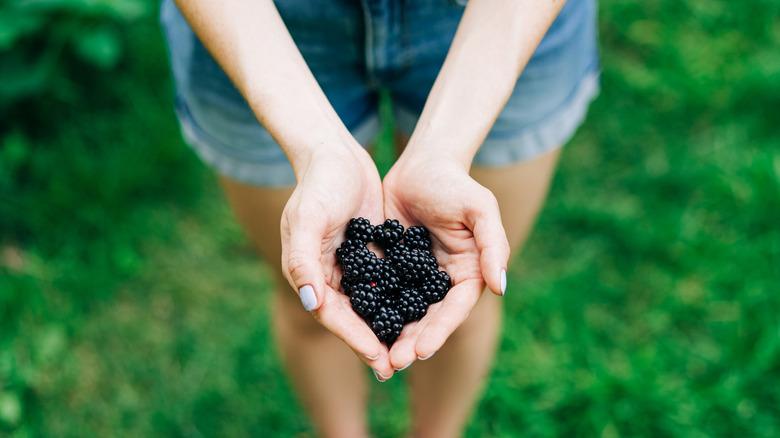The Difference Between Black Raspberries And Blackberries
When I lived in Pennsylvania, my home sat close to the woods which bordered my family's property. One summer night, I noticed some berries growing wild near our front yard. They weren't yet ripe, but I was certain they were blackberries. I'd check the bramble out every day after that, eagerly awaiting the day I could pick them. By the time they were fully ripe, I realized they weren't blackberries at all, but rather, black raspberries. The more my family and I intentionally foraged our property after this discovery, the more black raspberries we found over the years. But we found tons of blackberries, too. By the end of summer, I had bags of both in my freezer.
It's easy to conclude that black raspberries and blackberries are members of the same plant family, which is called Rosaceae. Interestingly enough, the two aren't technically berries at all, since they don't develop from a single ovary of a flower. The same goes for strawberries — they aren't actually considered berries. Instead, all three are called aggregate fruits, which form from multiple ovaries. This is why black raspberries and blackberries look like they are made up of tiny, juice-filled dots (called drupelets) stuck together in a clump. Although they are both considered summer berries and often used in the same ways, these fruits have plenty of differences, making each unique.
How black raspberries and blackberries are different
If you put these two berries next to each other, it's pretty obvious that black raspberries are considerably smaller than blackberries. When you pluck black raspberries from a bush, you'll notice they are hollow in the middle. This is because they detach from their stems when ripe. Blackberries are the opposite — solid and fleshy throughout. For the most part, the middle of blackberries contain a white stem and core, which are completely edible. When you look closely, you'll also notice that black raspberries aren't exactly smooth and shiny the way blackberries are. Instead, they are covered in microscopic hairs, giving the fruit a matte appearance. While both berries could be described as tasting sweet, that flavor is much more pronounced in the less-tart black raspberry.
Perhaps the biggest difference between these two doppelgangers is their availability. Many have never even seen black raspberries for sale, whereas grocery stores and farm stands across the country are overflowing with blackberries in the summertime. Black raspberries primarily grow wild east of the Rocky Mountains but also in Oregon where they are commercially cultivated. There are several varieties of the berry, but the main type sold commercially is called Munger. The black raspberry growing season is very short, around two to three weeks in July, making them rare and expensive when you do find them for sale.
Blackberries, on the other hand, naturally ripen a little later in the summer. One of the reasons that blackberries are so much more common is because they have been heavily hybridized or cross-bred in order to obtain different characteristics and heartiness levels. As a result, different types of blackberries can grow successfully in various climates, making them easy to find and generally affordable.
How black raspberries and blackberries are similar
Just like blackberries, black raspberries are dark purple in color — almost black. The color is the result of high levels of anthocyanins, a type of antioxidant which also makes the two berries exceptionally nutritious and protects the body from free radical damage. The fruits have bumpy, delicate skin that protect the flesh and juice inside each drupelet. Both are considered bramble plants, which basically means they grow on plants that fight back in the form of sharp leaves and thorns you must carefully maneuver to pluck the ripe fruits. They each contain plenty of edible seeds, although the ones in blackberries could be considered slightly more annoying since they are larger and good at getting stuck in your teeth.
Black raspberries and blackberries also both symbolize some of the best flavors of the warm summer season, and it's a joy eating them just as they are. Of course, these berries often go into recipes like jams and jellies (foods you can easily give a boozy edge), syrups, compotes, sauces, fruit tarts, and pies. The thing is, you can't exactly rely on the two being totally interchangeable. For one thing, their sugar levels are different. You may need more sugar in blackberry recipes to cut their sharpness and less with black raspberries since they are naturally sweeter.
Plus, you can expect much more juice (and, therefore, weight) from blackberries. Cooks can certainly mix the two together and adjust recipes accordingly, but I suggest setting at least a handful of black raspberries aside for eating on their own if you can find them. You'll know berries from the store are ripe if they smell fragrant and look vibrant.


